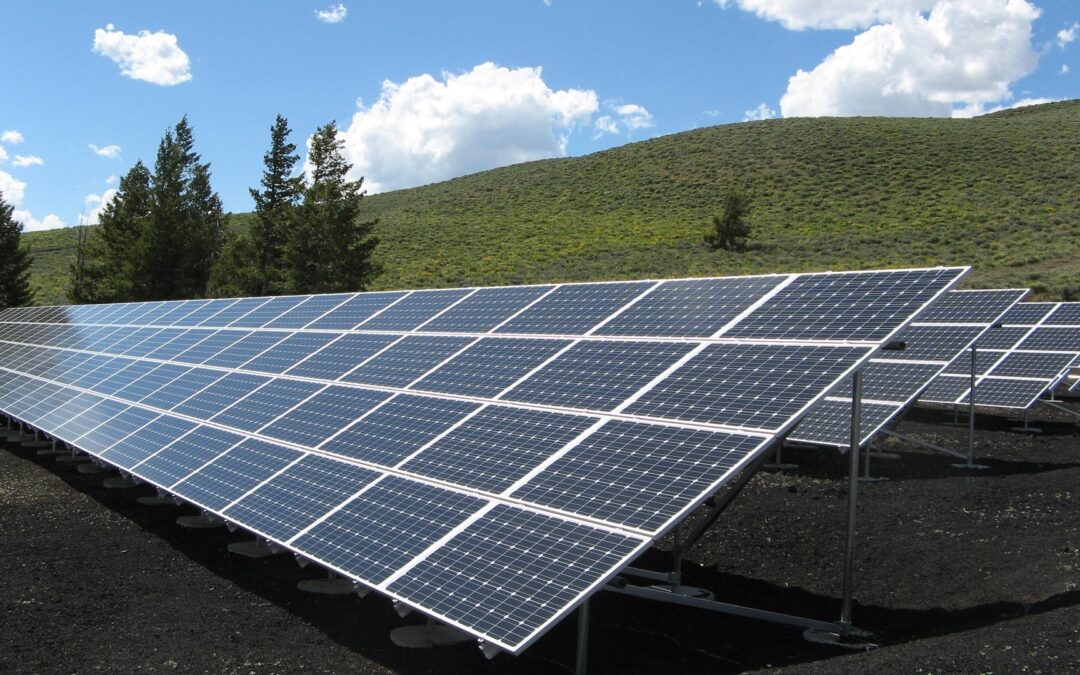
by Don Wichert | May 23, 2023 | Advocacy, Community Solar, Solar
From the Summer 2023 Hornblower newsletter, published by the Dudgeon Monroe Neighborhood Association.
Community solar is on a steep incline locally, regionally, and nationally. By the end of 2022 there were over 2,000 community solar projects distributed across 40 states, including Wisconsin.
Community solar allows individuals to support or own part of a solar system with others in their community. The supported solar system is typically located close to your county, has good solar access, and can take advantage of economies of scale and professional management.
Many households do not have the ability to adopt solar energy at their residence due to shade, are not owners, or don’t have the finances to purchase a solar system. The Dudgeon Monroe neighborhood has a lot of trees, which is fantastic for many reasons: shade, beauty, oxygen, wind barriers, and noise reduction, to name a few. However, large trees, especially on the south side, reduce the energy and economic ability to make electricity from the sun on your home or business.
Community solar allows almost everyone to support adoption of solar energy wherever they live or whatever their financial situation. The three current options for Dudgeon Monroe residents include: joining MGE’s Shared Solar Program, investing in the SolarShareWI Co-op created by RENEW Wisconsin, or Legacy Solar’s Co-op.
There are many ways to support solar in our neighborhood besides placing panels on a home or business. It’s a way to earn a modest return on extra cash while doing your part to support a clean energy future.
MGE’s Shared Solar program offers households and small businesses the opportunity to reserve a share of the electricity produced by MGE’s solar arrays in Middleton serving the program.
SolarShare WI Co-op allows co-op members to invest in 1-5 megawatt solar projects in Wisconsin and get a projected return on their investment of 5%.
Legacy Solar Co-op allows members to buy bonds or be a “Tax Sponsor” in systems typically on nonprofit commercial applications like churches, schools, and similar buildings.
Don Wichert, May 2023
Founder of RENEW Wisconsin and Emeritus board member.
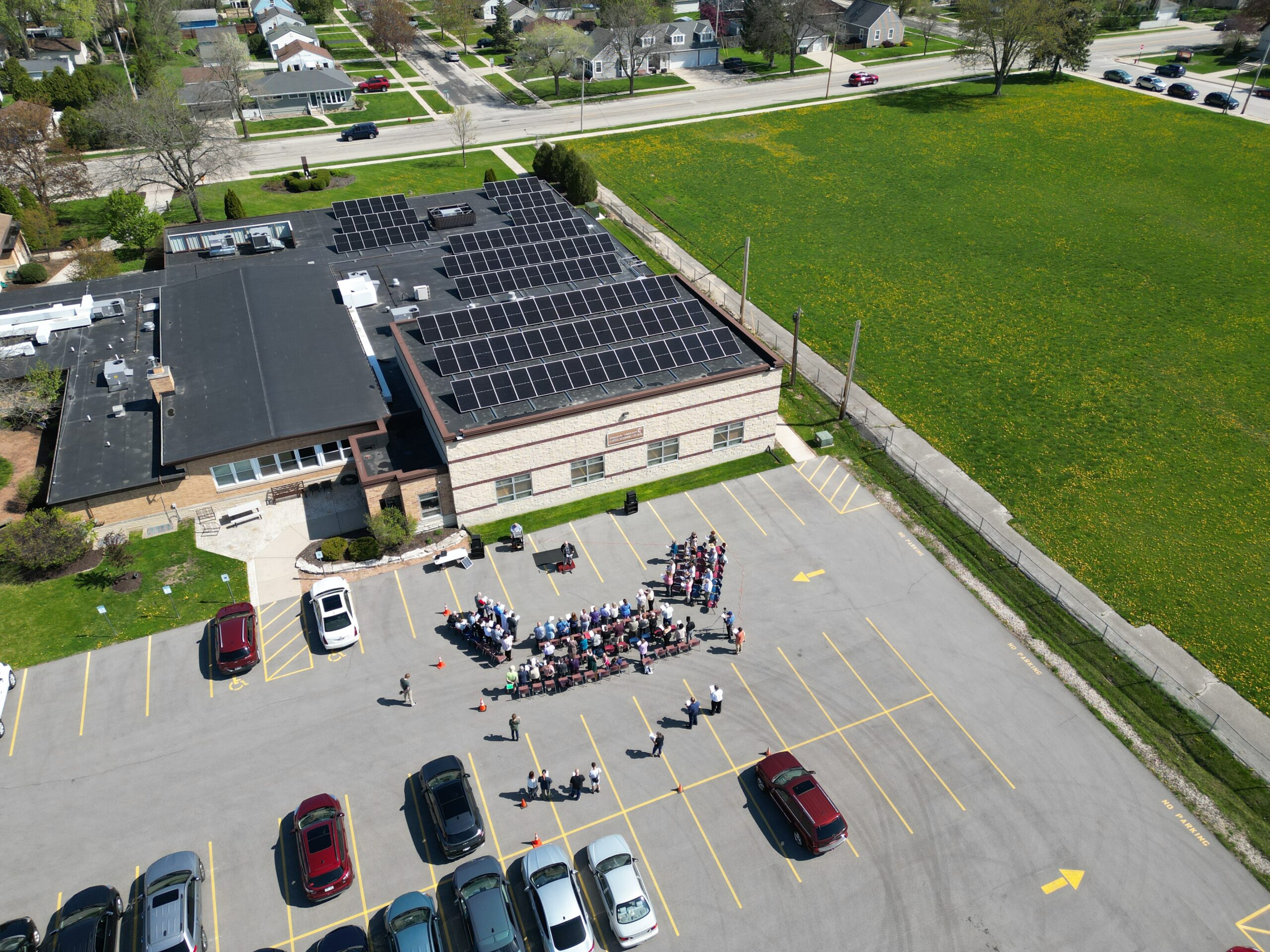
by Lauren Cohen | May 9, 2023 | Solar, Solar for Good
On Sunday, May 07, Emmanuel Community United Methodist Church (ECUMC) held a solar dedication ceremony for their 63-kilowatt, newly constructed solar array. Emmanuel Community United Methodist Church is a church located in Menomonee Falls, whose mission is to promote a vibrant and transformative community, sharing God’s love with its neighbors.
The solar system, installed by Arch Solar, consists of 118 solar panels and is anticipated to offset roughly 60% of the church’s annual electrical needs. “When evaluating layouts, Emmanuel decided to go with a “Wisconsin design to make the most of the winter sun and snow shedding,” said Andrew Holmstrom, C&I Solar Energy at Arch Solar. “This system will shed snow quicker, produce in low light conditions, and crank out power in the winter as well as the summer.”
Emmanuel Community United Methodist Church received support from Solar for Good, a RENEW Wisconsin program created in partnership with the Couillard Solar Foundation which aims to expand the use of solar power among nonprofits in Wisconsin. Emmanuel Community received 59 panels donated through this program.
In addition to this assistance, Emmanuel Community also worked with Legacy Solar Cooperative throughout its solar journey. Legacy Solar Cooperative provided valuable solar industry expertise as well as funding and financing assistance so that congregation members could help ECUMC get the most out of every renewable energy dollar being spent. They also helped the church compare multiple quotes on the project, which resulted in choosing Arch Solar as the installer.
The installation of this solar system not only increases the church’s fiscal responsibility but also helps meet its sustainability goals. “We are excited about our solar project because it furthers the ministry of our church to protect God’s creation,” said Doug Walters, chair of the church’s “Green Team” and key player of the project. “At the same time, it offers us a way to save money on our electrical bills for many years. It is an investment in our children’s future.”
Emmanuel Community United Methodist Church’s solar installation showcases their commitment to being good stewards of the environment and demonstrates how nonprofits and houses of worship can lead Wisconsin’s clean energy transition. This church exemplifies how renewable energy can be leveraged to serve the community, save money, and protect the planet.

by Jenna Greene | May 2, 2023 | Electrification, Health, Netzero Wisconsin, Renewables, Solar, Wind
In recent years, Wisconsin has set goals to expand clean energy and reduce greenhouse gas emissions. At the state level, in 2019, Governor Evers set a goal for 100% carbon-free electricity in Wisconsin by 2050. Utilities across the state have also set carbon emissions reduction targets and have made plans to retire Wisconsin coal plants. These goals signal that Wisconsin is moving toward an energy transformation.
With growing momentum to meet ambitious clean energy and climate goals, RENEW Wisconsin partnered with Clean Wisconsin, GridLab, and Evolved Energy Research in 2022 to evaluate the economic impacts of Wisconsin meeting electricity and carbon dioxide reduction goals. This study resulted in the report Wisconsin’s Roadmap to Net Zero by 2050 (Evolved Report). The Evolved Report includes modeling energy system changes in two primary scenarios. The first scenario models 100% carbon-free electricity by 2050 (100% Clean Electricity), and the second scenario models net-zero carbon dioxide emissions economy-wide by 2050 in Wisconsin (Net Zero Economy-Wide).
The Evolved Report summarizes the benefits and costs associated with these scenarios. However, these summaries do not provide detailed ‘apples-to-apples’ analysis for economic comparisons. For example, the Evolved Report included annual infrastructure investment ‘system’ costs and benefits results over the 2022-2050 time period. Additionally, the Evolved Report provides health benefits using a separate modeling tool that captures benefits in snapshots in time at 2030 and 2050. However, from the perspective of climate change impacts, the Evolved Report does not monetize the benefits of carbon dioxide emissions reductions. To thoroughly compare the cost-effectiveness of these scenarios, RENEW set out to perform a supplementary analysis to bring together and compare the cost and benefits streams between now and 2050 in different modeled scenarios.
To combine the streams of benefits and costs, RENEW conducted a benefit-cost analysis of the cumulative benefits and costs of these scenarios titled Benefit and Cost Impacts of Reaching Clean Energy and Carbon Emissions Reduction Goals in Wisconsin (Benefit Cost Report). Benefit-Cost Analysis (also referred to as cost-benefit analysis) is a process that identifies, monetizes, and compares the effects of alternatives. This form of analysis is often used to compare different policies, programs, or projects. In a real-world example, The Public Service Commission often relies on intensive benefit-cost analysis to weigh a proposed utility project (such as a large solar or transmission facility) against other feasible alternatives. In short, RENEW’s Benefit Cost Report is intended for policymakers, government officials, business leaders, and those skeptical of the clean energy transition or concerned that the negative economic impacts of this transition will outweigh the benefits.
To complete this benefit-cost analysis, RENEW staff worked closely with the lead modeler to receive and understand all the data behind the many facts and figures in the Evolved Report. The RENEW team then analyzed the data by interpolating the time series data and discounting the data over time to accurately compare costs and benefits occuring at the different points over multiple decades. This process ensured value streams were accurately identified, separated, compared on common terms, and not double counted in total results. An additional description of the analytical process can be read in the Approach section of the Benefit Cost Report.
Reaching 100% Clean Electricity Yields High Benefits Compared to Costs, Achieves ¼ of Needed Emissions Reductions
Accomplishing 100% Clean Electricity by 2050 is a cost-effective target, as the benefits far outweigh the costs when all benefits are considered. Meeting 100% Clean Electricity by 2050 would cost an estimated $12 billion between 2023 and 2050 to build new renewable energy infrastructure. But the operation of these renewable energy facilities would avoid fossil infrastructure investments and ongoing fuel costs. The avoided costs of fossil fuels and associated infrastructure, which is an economic benefit of $8.75 billion, is somewhat less than the renewable energy investment alone. However, when considering additional benefits, this is clearly a cost-effective scenario.
The benefits of replacing fossil fuels with clean electricity go beyond the avoided infrastructure and fuel costs. When health benefits and avoided carbon dioxide emissions are also included, the benefits of clean electricity outweigh the costs five to one. For every dollar of investment spent to transition to 100% Clean Electricity, Wisconsin will see $5 in benefits. However, as the Evolved Report details, the 100% Clean Electricity scenario only achieves about ¼ of all carbon emission reductions compared to economy-wide decarbonization.
Economy-Wide Decarbonization in Wisconsin Results in Billions of Dollars of Benefits and Remains Cost-Effective
According to the modeling results, going beyond 100% Clean Electricity to decarbonize the entire economy would cost more money in direct investments but would yield hundreds of billions of net benefits. The estimated economic cost of the Net Zero Economy-Wide scenario is $111 billion from 2023 – 2050. The direct economic benefits from avoided fossil fuel costs will be $111 billion over that same period. The health and climate benefits are much higher in the Net Zero Economy-Wide scenario compared to the 100% Clean Electricity scenario. Including all health and environmental benefits, the benefits outweigh the costs in the Net Zero Economy-Wide scenario by $111 billion. Although net-zero transition requires more investment, the benefits are also higher for Wisconsinites. The more considerable investment associated with the Net Zero Economy-Wide scenario results in a more significant return on that investment for Wisconsin’s economy, as presented in the table below.
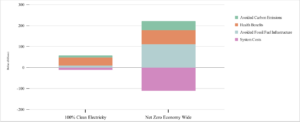
Transitioning to a Clean Economy Creates a Healthier Wisconsin
In both scenarios, Wisconsinites would see considerable health benefits by reducing fossil fuel use. These health benefits are measured through an air pollution model that estimates the changes in air pollutants called criteria air pollutants¹.
Reducing our use of fossil fuels will have significant health benefits in Wisconsin, resulting in fewer heart attacks, respiratory and cardiovascular hospital admissions, acute bronchitis and respiratory symptoms, and asthma emergencies. For our analysis, we monetized the low and high-range emissions reductions estimated by the COBRA model and included the monetized benefits in the final benefits calculation of the Benefit Cost Report. In the 100% Clean Electricity scenario, the modeled health benefits are estimated to be between $18 billion and $40 billion cumulatively through 2050. In the Net Zero Economy-Wide scenario, where fossil fuels are reduced further, the health impacts are estimated to be between $30 billion and $68 billion.
Jobs, Jobs, Jobs!
A related report by Cambridge Econometrics, titled The Economic Impacts of Decarbonization in Wisconsin (Cambridge Report), provided estimates of the job growth and Gross State Product (GSP) impacts of decarbonization. The table below summarizes these impacts.
| Scenario |
Gross State Product Increase by 2050 |
Net Job Growth by 2050 |
| Net Zero Economy-Wide |
3.0% |
68,500 additional jobs |
| 100% Clean Electricity |
0.5% |
7,320 additional jobs |
The results of the Cambridge Report further emphasize the differences in the volume of benefits between the 100% Clean Electricity scenario and the Net Zero Economy-Wide scenario. The Cambridge Report results are clear: full decarbonization will lead to massive job growth and economic development for Wisconsin.
Public-private partnerships and planning will help ensure Wisconsin benefits from the clean energy transition and attracts job creators to our state. An article from Wisconsin Public Radio (WPR) describes the potential of the clean energy economy transition and the challenges ahead. The WPR article highlights a recent Wisconsin Economic Development Corporation report on Wisconsin’s potential for EV component production, and highlights the need to develop workforce training to ensure Wisconsin remains competitive and an attractive location for clean economy manufacturers.
Meeting Clean Energy and Carbon Reduction Goals: A Win-Win for Wisconsin
The analysis performed by RENEW Wisconsin shows that meeting either the 100% Clean Electricity goal by 2050 or the Net Zero Economy-Wide target by 2050 will result in more benefits than costs for the state. Meeting either goal by 2050 is cost-effective, as each dollar invested in energy system changes results in more than one dollar in total benefits. While the 100% Clean Electricity goal is more cost-effective from an incremental perspective, reaching the Net Zero Economy-Wide goal results in greater benefits and achieves economy-wide net zero carbon emissions. Decarbonizing the entire economy requires more investment but results in considerable advantages in terms of avoided fossil fuel costs, health benefits, and avoided carbon dioxide emissions.
Fully decarbonizing Wisconsin’s economy is also critical to meet climate change goals. While transitioning the electric grid to 100% clean electricity is important, focusing only on the electricity sector will not be enough to address the greenhouse gas emissions that cause climate change. The United Nations Intergovernmental Panel on Climate Change has found that keeping global temperatures from rising beyond 1.5 degrees above pre-industrial levels requires net zero carbon dioxide emissions by 2050². This goal is aligned with the 2015 Paris Agreement to pursue efforts to limit the temperature increase to 1.5 degrees C above pre-industrial levels³. The Net Zero Economy-Wide target for Wisconsin is most aligned with this goal and is an important target to prevent the worst impacts of climate change.
Reaching either clean energy goals or broader emission reductions result in benefits, including extensive benefits to human health. RENEW Wisconsin is excited to support the development of clean energy in the state, supporting economic development, human health benefits, and the mitigation of climate change.
Footnotes
1. Analysts used a tool, COBRA (Co-Benefits Risk Assessment Health Impacts Screening and Mapping Tool), to model air pollution changes and the impact on human health. The tool was developed by the United States Environmental Protection Agency.
2. https://www.ipcc.ch/site/assets/uploads/sites/2/2022/06/SPM_version_report_LR.pdf
3. https://unfccc.int/most-requested/key-aspects-of-the-paris-agreement
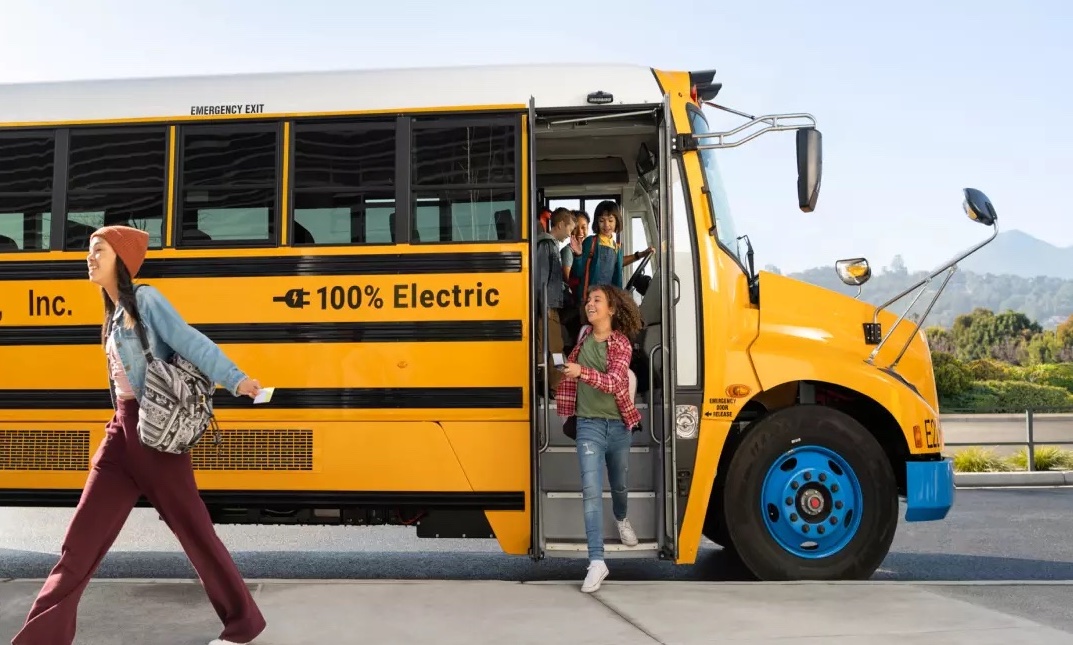
by Francisco Sayu | Apr 27, 2023 | Electric Vehicles, Electrification, Inflation Reduction Act
The Environmental Protection Agency (EPA) just announced a new round of competitive funding through the Clean School Bus (CSB) Grants Program. This is the second funding opportunity for clean school buses from the Infrastructure Investment and Jobs Act (IIJA). Unlike the 2022 Clean School Bus Rebates, this new funding opportunity is competitive – instead of a lottery. We encourage school districts to partner with other communities, transportation providers, and electric utilities for their application. Any eligible school district or third-party applicant must be set up on grants.gov and SAM.gov. Interested parties should confirm they are registered and current on both websites as soon as possible.
Why Electric School Buses?
Cost savings: electric buses get the equivalent of 17 miles per gallon (MPG) compared to 6 MPG for diesel buses; these savings can amount to more than $170,000 across the bus lifecycle.
Health benefits: electric school buses cut diesel emissions, benefiting communities burdened by air pollution and high childhood asthma rates.
Energy security and independence: electric buses can run on locally sourced renewable energy from a nearby solar or wind farm, which helps the local economy.
Electric buses have operated safely and reliably in many parts of the United States, including Michigan, Minnesota, and Alaska. Although electric buses are cheaper to own and operate than traditional diesel buses, the initial cost of new buses has been a barrier to adoption, and only a few schools have been able to afford them. The Clean School Bus (CSB) Grants Program is solving this problem by covering up to 100% of the cost of new buses so that schools can save money without a significant out-of-pocket expense. Sounds too good to be true? Check out this blog post to find the list of school districts that already received awards for new electric buses in Wisconsin.
2023 Clean School Bus (CSB) Grants Program Overview
The EPA is awarding approximately $400 million in competitive grants under the Clean School Bus (CSB) Grants Program. The grant application will allow for a minimum of 15 buses and up to 50 buses for school district applicants and for a minimum of 50 and up to 100 buses for third-party applicants serving at least four school districts. Awardees will receive up to $395,000 per bus without cost-sharing or matching requirements. Applications must be submitted electronically to EPA through grants.gov by Tuesday, August 22, 2023, at 11:59 p.m. (ET).
Eligible applicants include the following entities:
- Local or State governmental entities providing school bus service to one or more public school systems
- Indian Tribes, Tribal organizations, and tribally controlled schools providing school bus service to one or more Bureau-funded schools
- Nonprofit school transportation associations
- Public charter school districts responsible for the purchase, lease, license, or contract for the service of school buses for that charter school
- Eligible contractors
Please refer to the grant Notice of Funding Opportunity (NOFO) for specific information about this
competition.
Important Dates
| Activity |
Date |
| Information Sessions |
The first Information Session will be on Wednesday, May 10, 2023, at 3:00 p.m. (ET). Click here to register. |
| Deadline for Submitting Questions |
Wednesday, August 9, 2023, at 11:59 p.m. (ET) |
| NOFO Closes – Application Deadline |
Tuesday, August 22, 2023, at 11:59 p.m. (ET) |
| Anticipated Notification of Selection |
November 2023 to January 2024 |
| Anticipated Awards |
February to March 2024 |
Schools can submit questions to cleanschoolbus@epa.gov. Please type “Clean School Bus NOFO Question” in the subject line of your email. The deadline for submitting questions via email is Wednesday, August 9, 2023, at 11:59 p.m. (ET). Schools may also contact Francisco Sayu, Emerging Technologies Director RENEW Wisconsin, at francisco@renewwisconsin.org, for general help with this grant application.
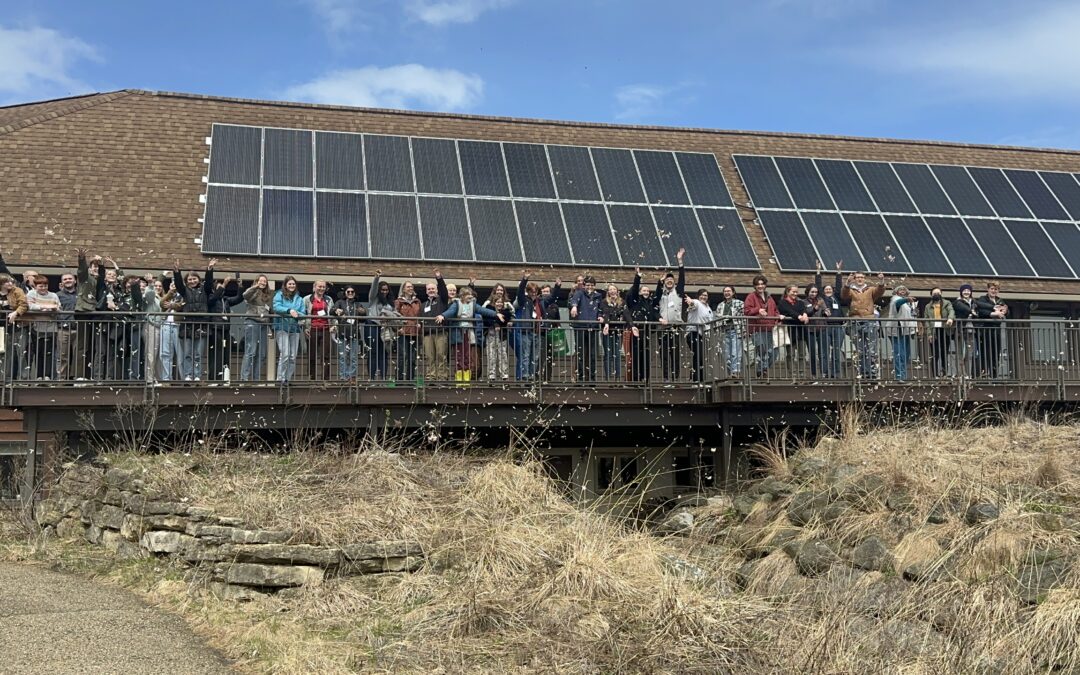
by Lauren Cohen | Apr 26, 2023 | Solar, Solar for Good
On Saturday, April 22, The University of Wisconsin Madison Arboretum celebrated Earth Day by holding an event dedicated to celebrating their sustainability efforts, including a solar dedication ceremony. They aim to conserve and restore the Arboretum lands, advance restoration ecology, and foster the land ethic.
SunPeak installed this 25.16 kW solar system on the Arboretum Visitor Center, and consists of 66 PV modules. The system is estimated to produce 32,000kWh of annual energy and will cover around 8% of the Arboretum’s electricity needs.
The University of Wisconsin Madison Arboretum includes the world’s oldest and most varied collection of restored ecological communities. With this global status, it is expected that the visibility of this solar array will be far-reaching. “Our mission to foster the land ethic involves promoting sustainable relationships between people and the land,” said Karen Oberhauser, Director of the Arboretum. “A key driver of people/land interactions involves energy production, extraction, and consumption. Thus, we are dedicated to decreasing our institutional carbon footprint, serving as an example of sustainable energy production and use.”
This project received funding from Focus on Energy and a generous donation from Friends of the Arboretum, and the Green Fund, a program of the UW-Madison Office of Sustainability that supports student ideas to improve campus stability. In addition to this financial support, The University of Wisconsin Madison Arboretum also received a panel grant from Solar for Good, a RENEW Wisconsin program in partnership with the Couillard Solar Foundation. Solar for Good granted the Arboretum a total of 68 solar panels.
This project was brought to fruition largely due to the assistance of UW Madison student organizations, specifically Helios, whose members were active participants in all project stages, including drafting grant proposals, calculating the system’s impact, and engaging with their campus and community audiences. In addition to the UW Madison Arboretum, Helios and the Green Fund were also instrumental in getting a solar system installed on the University’s Gordon Dining & Event Center.
“We appreciate the generosity of donors and funders, the dedication of staff, the collaboration of students, and the assistance of campus and community partners as we strive to create a greener building for work and public learning,” said Susan Day, Communications Coordinator with the Arboretum.
“As an environmental research center, the Arboretum is dedicated to decreasing its institutional carbon footprint, serving as an example of sustainable energy projection and use, and informing the public about these efforts,” continued Day.
As a leader in the global ecological realm, the Arboretum’s solar installation will be visible to thousands of people over its 30-year lifespan. With this level of visibility, the UW Madison Arboretum will serve as a model to other organizations to take the first step in their renewable energy journey.
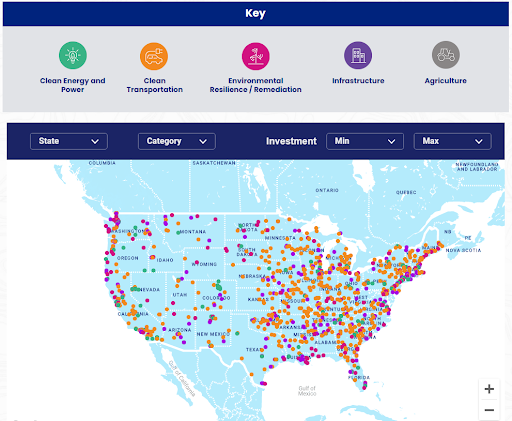
by Francisco Sayu | Apr 26, 2023 | Electric Vehicles, Electrification, Inflation Reduction Act
The clean energy revolution is taking place across America, and Wisconsin communities can benefit in several ways. For example, by transitioning from fossil fuels to renewable energy, the state can reduce its dependence on expensive fuel imports, which currently amount to $14 billion annually. Clean energy can also support new jobs, attract private investment, reduce carbon emissions, improve public health, and create a more sustainable environment for future generations.
The federal government has ambitious clean energy goals, and communities across Wisconsin are taking advantage of federal programs like the Infrastructure Investment and Jobs Act (IIJA) and the Inflation Reduction Act (IRA) to replace aging diesel school buses, rebuild bridges and ports, and improve air quality and resiliency. This blog post highlights clean energy investments made in Wisconsin communities through the IIJA and the IRA (see table below). Projects were identified using “The Climate Wins Here map” developed by ActOnClimate. Feel free to use this interactive tool to learn about ongoing clean energy investments in Wisconsin and beyond.
Despite these wins, we must do more to support clean energy deployments in the state. A recent Wisconsin Public Radio report highlights that rural communities are disadvantaged when competing for federal funding. Paradoxically, these rural communities have the greatest needs and opportunities to benefit from federal funding. Whether it is a solar project that reduces coal imports, a new electric school bus that cuts fuel costs, or a microgrid that increases reliability, these projects improve the quality of life for host communities.
In her book “Rural Renaissance, Revitalizing America’s Hometowns through Clean Power” Michelle Moore presents a practical and inspiring guide to creating economic opportunity through clean energy. Moore uses examples from communities across the U.S. leveraging natural resources, cooperative work, and innovation to bring electricity and prosperity to rural America. Today, the clean energy transition provides another opportunity to leverage our abundant resources (sunlight, wind, and land) and federal clean energy investments to create a more prosperous life for all Wisconsinites. It is up to us, and we must seize this opportunity.
In short, federal clean energy legislation has opened up new opportunities for communities in Wisconsin to improve their quality of life. The Climate Wins Here map is a helpful tool for identifying ongoing clean energy investments in the state. We encourage communities to use data, technology, and partnerships to build a cleaner, more sustainable future through clean energy. Feel free to contact RENEW for more information about federal funding for clean energy projects in your community.
Federal Clean Energy Investments in Wisconsin, April 2023
Project
|
Category
|
Agency
|
Funding Amount
|
ARP Enhanced Air Quality Monitoring Competitive Grant
|
Clean Energy and Power
|
EPA
|
$429,746
|
ARP Enhanced Air Quality Monitoring Competitive Grant
|
Clean Energy and Power
|
EPA
|
$500,000
|
Awarded Clean School Bus Program Rebates
|
Clean Transportation
|
EPA
|
$790,000
|
Awarded Clean School Bus Program Rebates
|
Clean Transportation
|
EPA
|
$3,950,000
|
Awarded Clean School Bus Program Rebates
|
Clean Transportation
|
EPA
|
$4,740,000
|
Awarded Clean School Bus Program Rebates
|
Clean Transportation
|
EPA
|
$ 1,975,000
|
Awarded Clean School Bus Program Rebates
|
Clean Transportation
|
EPA
|
$1,185,000
|
Awarded Clean School Bus Program Rebates
|
Clean Transportation
|
EPA
|
$1,885,000
|
Awarded Clean School Bus Program Rebates
|
Clean Transportation
|
EPA
|
$395,000
|
Awarded Clean School Bus Program Rebates
|
Clean Transportation
|
EPA
|
$30,000
|
Awarded Clean School Bus Program Rebates
|
Clean Transportation
|
EPA
|
$790,000
|
Awarded Clean School Bus Program Rebates
|
Clean Transportation
|
EPA
|
$1,580,000
|
Awarded Clean School Bus Program Rebates
|
Clean Transportation
|
EPA
|
$395,000
|
Awarded Clean School Bus Program Rebates
|
Clean Transportation
|
EPA
|
$2,370,000
|
Awarded Clean School Bus Program Rebates
|
Clean Transportation
|
EPA
|
$150,000
|
FTA Bus and Low- and No- Emission Grant Awards
|
Clean Transportation
|
DOT
|
$3,796,872
|
Awarded Clean School Bus Program Rebates
|
Clean Transportation
|
EPA
|
$395,000
|
Promoting Resilient Operations for Transformative, Efficient, and Cost-Saving Transportation
|
Environmental Resilience/Remediation
|
DOT
|
$201,221
|
Tribal Climate Resilience
|
Environmental Resilience/Remediation
|
DOI
|
$250,000
|
Tribal Climate Resilience
|
Environmental Resilience/Remediation
|
DOI
|
$212,079
|
National Coastal Resilience Fund
|
Environmental Resilience/Remediation
|
NOAA
|
$455,800
|
RAISE 2022 Grant Award
|
Infrastructure
|
DOT
|
$2,952,050
|
Port Infrastructure Development Grant Awards
|
Infrastructure
|
DOT
|
$10,134,800
|
RAISE 2022 Grant Award
|
Infrastructure
|
DOT
|
$5,341,931
|
RAISE 2022 Grant Award
|
Infrastructure
|
DOT
|
$13,476,269
|
|
|
Total
|
$58,380,768
|
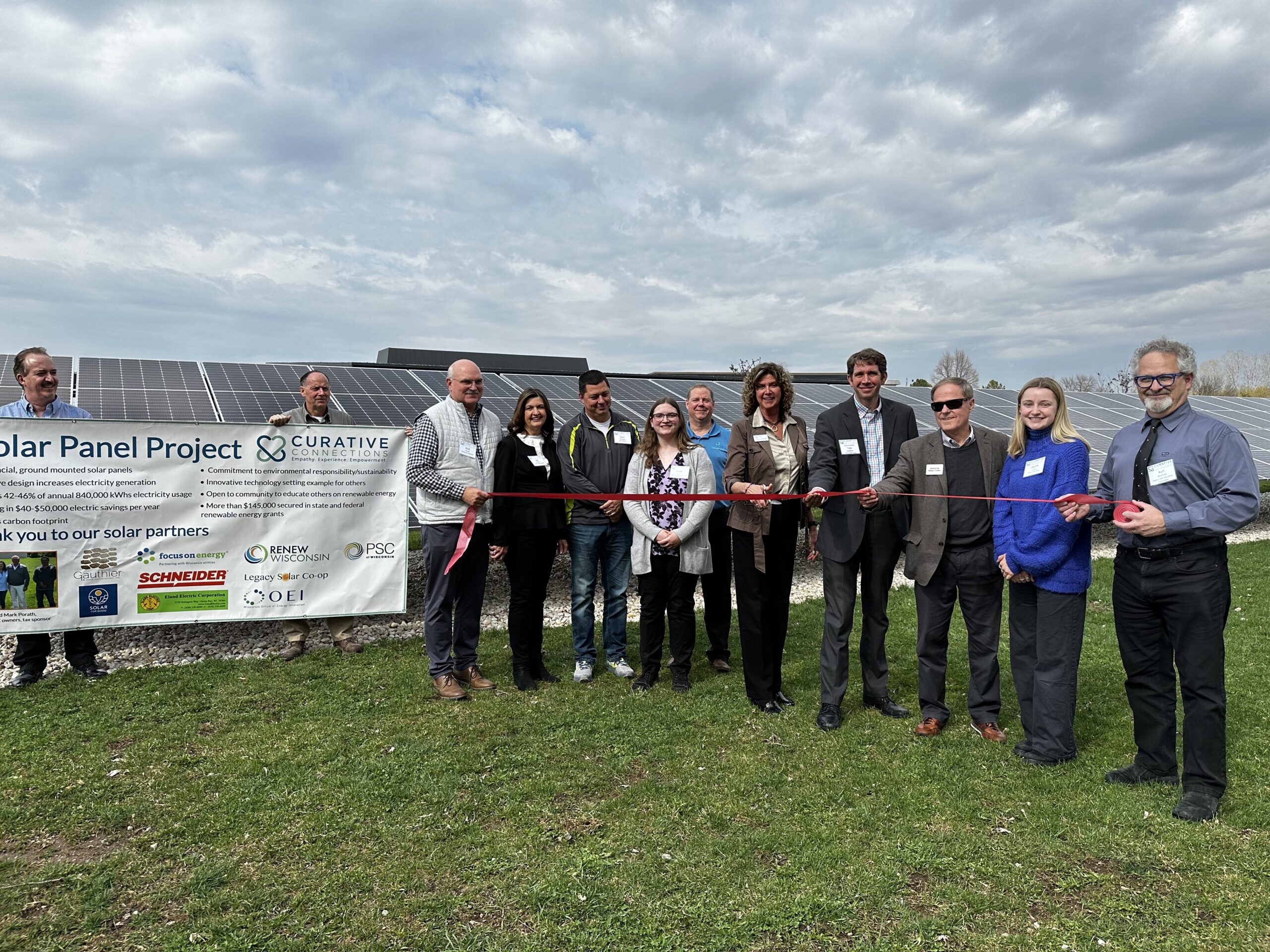
by Lauren Cohen | Apr 24, 2023 | Press Release, Solar, Solar for Good
On Thursday, April 20, Curative Connections held a ceremony dedicated to their new 280-kilowatt solar array. Curative Connections aims to help people reach their goals for independence by providing essential services to older adults and those with disabilities.
This solar system was installed by Eland Electric and is projected to offset 42-46% of the organization’s electricity usage. “We had a great experience with this project, from design and engineering all the way to commissioning,” said Jesse Michalski, Project Manager at Eland Electric. “This project was a little unique in that we had limited space and were trying to maximize the energy output of a solar array, and through the use of bi-facial modules, we were able to achieve a design that fits the customer’s goals.”
The economic implications of this array for Curative Connections are wide-reaching. The newly installed solar array is projected to bring the organization $50,000 of annual savings. “As a nonprofit, this is critical as we can now redirect these savings to support for our programs and the thousands of members
we serve each year,” said Jeanne Stangel, President and CEO of Curative Connections.
This solar installation is momentous as the organization celebrates an impressive milestone. “Curative Connections is proud to cut the ribbon on our solar project as it shines light upon another reason to celebrate our 75th anniversary year,” continued Stangel.
The project was funded largely by a $125,000 Office of Energy Innovation grant and financial support from Focus on Energy. Curative Connections also received a $10,000 grant from Solar for Good, a RENEW Wisconsin program run in partnership with the Couillard Solar Foundation.
“This solar project is a testament to the power of partnership between mission-driven nonprofits and clean energy advocates,” said Lauren Cohen, Program Coordinator with RENEW Wisconsin. “Solar for Good’s success is a direct result of organizations like Curative Connections leading the way towards a more sustainable future for Wisconsin and beyond.”
In addition to their grant funding, Curative Connections worked with Legacy Solar Cooperative to partner with a tax sponsor to take advantage of tax credits, which were not yet available to nonprofit organizations at the time of installation.
“We are grateful for the support we received from foundations, federal and state grants, and community partners,” continued Stangel. “This is a collaborative effort of a commitment to environmental responsibility and sustainability.”
With 75 years of serving the public under their belt, the money saved from this solar installation will allow Curative Connections to continue its mission to ensure that everyone receives the care they deserve. This project demonstrates the organization’s commitment to this mission and the environment, which others can look to and hopefully be inspired to embark on a similar path.
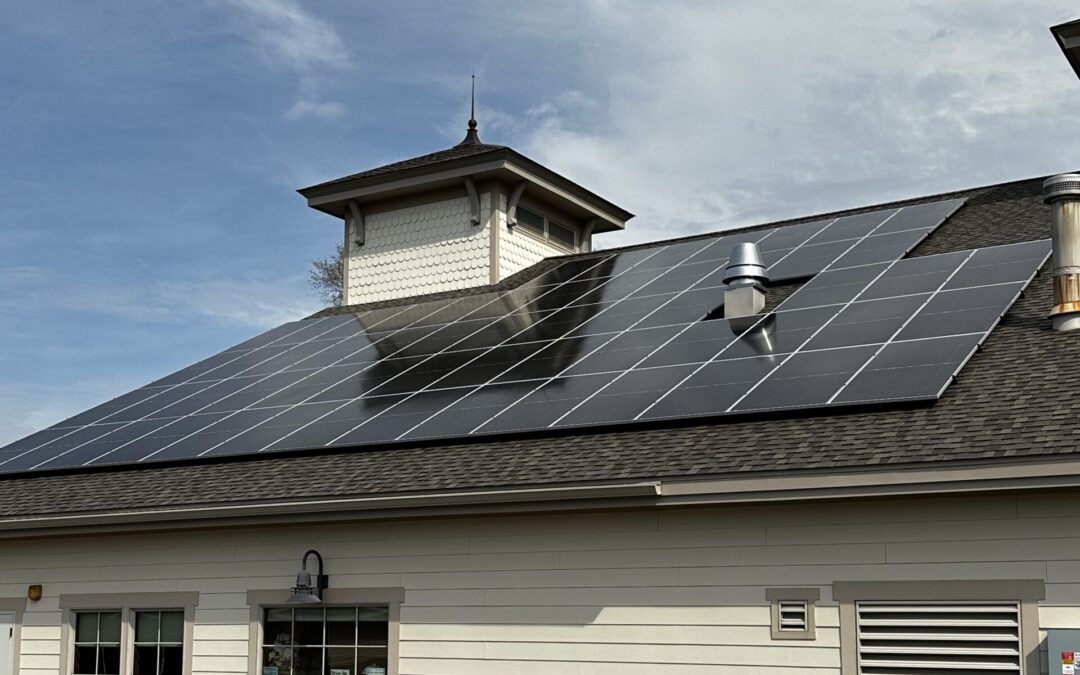
by Lauren Cohen | Apr 17, 2023 | Press Release, Solar, Solar for Good
On Saturday, April 15, the Shirley M. Wright Memorial Library held a solar dedication ceremony for their 32-kilowatt, newly constructed solar array. Scenically located on the Mississippi River and the bluffs of the Driftless Region, the Shirley M. Wright Memorial Library is dedicated to serving the rural communities of Trempealeau by offering free and equitable access to lifelong learning and enrichment.
The project, installed by Ethos Green Power, consists of 60 solar panels and is projected to offset 100% of the library’s electric needs. “This investment will save thousands in tax dollars that can be repurposed for other community needs,” said Alicia Leinberger of Ethos Green Power Cooperative. “In just a few years, the savings will offset the initial investment, providing decades of free electricity harvesting sunshine on the library roof.”
The library received over $83,000 in grants and incentives to install this solar array. Among these, the Shirley M. Wright Memorial Library received an EBSCO Solar Grant, a program that funds library solar installations.
The Shirley M. Wright Memorial Library was also awarded a panel grant from Solar for Good, an initiative provided by RENEW Wisconsin and the Couillard Solar Foundation to expand solar power within the state. The grant provided 30 of the 60 solar modules necessary for the project. “The solar grants and incentives we received will help the library purchase less power generated by fossil fuels, allowing our library to be financially and environmentally sustainable, all while acting as a catalyst to inspire change in the community,” said Jessica Schoonover, Library Director.
The library has laid out several opportunities for the community to interact with and be inspired by this solar array. “The very visible solar panels and the monitoring available on the website make it easy for the public to get curious,” continued Leinberger.
This solar installation will be an example to the Trempealeau community, showing its residents the economic and environmental benefits of adopting sustainable practices. It is just one aspect of a new initiative the library is adopting called SWML Renew, aimed at beginning sustainable, energy-conserving changes to its footprint. “We are working on doing our part to develop, model, educate, and encourage our community to live mindfully of our environment,” continued Schoonover. “We hope to encourage our neighbors to consider energy-efficient ways they can Renew their homes and businesses to make a more resilient future for Trempealeau.”
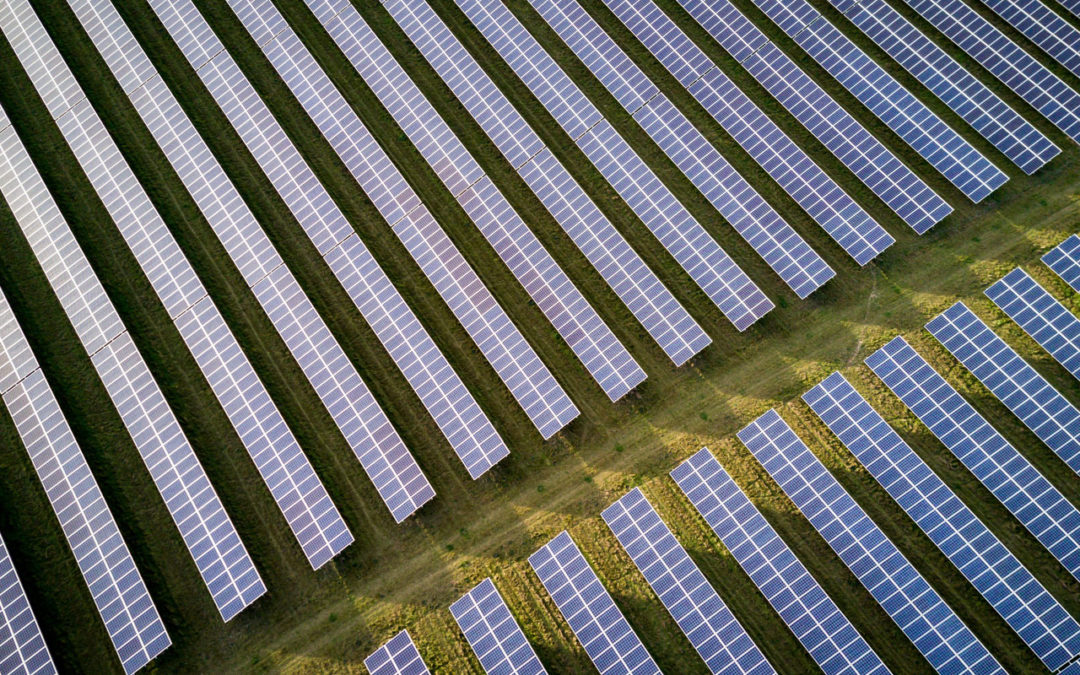
by Michael Vickerman | Apr 6, 2023 | Action Alert, Advocacy, Public Service Commission, Solar, Utility Scale
Langdon Mills Solar is a 200-megawatt solar project with a 50 MW battery energy storage system proposed for development in the Towns of Courtland and Springvale in Columbia County, Wisconsin. As designed, Langdon Mills Solar would generate homegrown, affordable, emission-free electricity sufficient to power the equivalent of approximately 30,000 homes. If approved, construction on Langdon Mills will begin in 2024 and is anticipated to be operational in 2026. For more information, visit the application here. If you want to learn more about how Langdon Mills Solar has engaged with the community, check out their website here. RENEW Wisconsin submitted testimony in support of Langdon Mills Solar in Docket 9818-CE-100, which you can access here.
Solar projects larger than 100 megawatts must gain approval from the Public Service Commission of Wisconsin (PSCW) before they can proceed to construction. Along the way, there are opportunities for public comment at the township, county, and state levels.
Please help us demonstrate Wisconsin’s enthusiastic support for solar power and this project by submitting a comment supporting Langdon Mills Solar. Be sure to specifically reference the project and the benefits that it can bring to Wisconsin. The deadline for submitting comments is May 23, 2023.
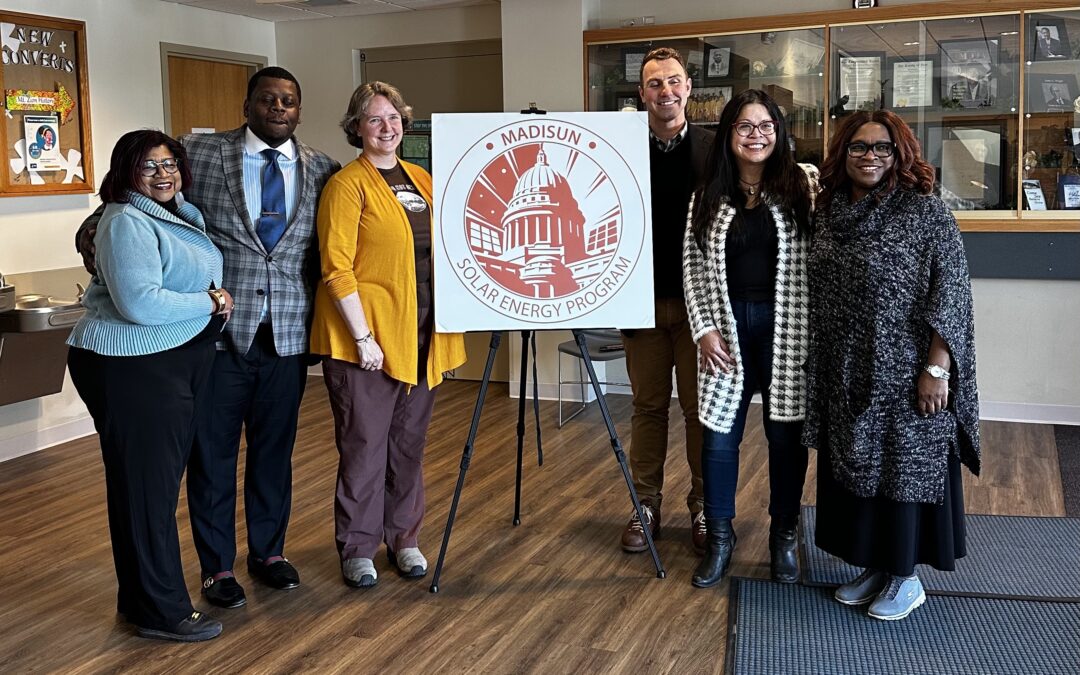
by Julia Holzschuh | Mar 29, 2023 | Press Release, Programs, RENEW Wisconsin
On Tuesday, Madison Mayor Satya Rhodes-Conway and RENEW Wisconsin announced the launch of MadiSUN’s 2023 Solar Programs, the City’s initiative to expand solar energy for local homes, businesses, affordable housing providers, and nonprofits. Participants included Sam Dunaiski, Executive Director of RENEW Wisconsin; Rev. Dr. Marcus Allen Sr., Pastor of Mt. Zion Baptist Church; and Maria Redmond, Director of the Wisconsin Office of Sustainability and Clean Energy.
MadiSUN is the City of Madison’s initiative to help foster the expansion of solar renewable energy. It consists of three programs: Group Buy for Homes, Solar for Businesses, and the Backyard Solar Grant. The Group Buy for Homes program simplifies the process of going solar for Dane County homeowners by putting them into direct contact with reputable solar installers. Since 2016, it has helped 289 Dane County residents install solar panels, totaling over 1600 kW. Solar for Business aims to educate and encourage Madison-based businesses to install solar power at their facilities. Since the program’s inception in 2018, they have awarded grants to 24 businesses with an aggregate capacity of 1600-kW and a total investment of $2,200,435. The Backyard Solar Grant fosters access to solar power for Madison-based community organizations and affordable housing providers that serve City of Madison residents. 19 organizations have received grants from the Backyard Program, with Mt. Zion Baptist Church receiving a $10,000 grant in 2021 for their 21.6-kW solar array. Looking forward to the 2023 season, MadiSUN is optimistic about the new possibilities presented by the Inflation Reduction Act on the programs. With nonprofit organizations now able to utilize previously unavailable solar incentives and an increase in the Solar Investment Tax Credit, RENEW is excited to facilitate the continued growth of these programs.
“I anticipate 2023 will be our best year yet!” said Sam Dunaiski, Executive Director of RENEW Wisconsin, “As administrator of the MadiSUN programs, RENEW believes in an all-of-the-above approach to renewable energy adoption. MadiSUN helps community organizations lower the upfront costs of solar, it helps Madison businesses navigate the questions around commercial solar implementation, and it makes going solar easy and affordable for local homeowners. These solar projects will help residents throughout the Madison area save money on their utility bills and reduce their carbon footprint.”
“We felt that installing a solar system would help the church serve the South Madison community by providing an example of leadership in demonstrating to the minority community the importance of good environmental stewardship.” said Pastor Allen of Mt. Zion Baptist Church. “We want to show the community the potential of long-term benefits of reducing dependence on nonrenewable resources thus, reducing the church’s carbon footprint.”
Federal investments from the Inflation Reduction Act (IRA) will complement and accelerate Madison’s Climate Forward Agenda by providing much-needed funding to reduce greenhouse gas emissions from the building and transportation sectors. IRA incentives will help increase the reach of City programs that support energy efficiency upgrades to naturally occurring affordable housing, and rooftop solar for homes and businesses through MadiSUN, and accelerate the transition of the City’s fleet to low- and no-carbon fuels, among other ongoing initiatives. The timing is fortuitous for new programs as well. The City’s new Building Energy Savings Program will help large commercial building owners identify opportunities to increase their energy efficiency and save money.
“I am very excited about the opportunities President Biden’s Inflation Reduction Act will bring for our MadiSUN program. The bill will allow thousands of Madisonians to transition to clean energy and grow the energy efficiency of their homes and businesses,” said Mayor Satya Rhodes-Conway.
The IRA will help Madison accelerate and reach its climate goals by providing funding directly to local households, businesses, and nonprofits to reduce energy costs and make clean energy and transportation more accessible for everyone. This can be done through: home energy efficiency upgrades, home energy systems, using electric vehicles, growing Wisconsin’s green economy, and by businesses utilizing energy cost savings.
- Home energy efficiency upgrades – The law includes rebates for energy-efficient electric heat pumps, water heaters, stoves, ovens, or other home appliances with more energy-efficient electric appliances for low- and moderate-income households. Any household can receive tax credits covering 30% of the cost of home construction projects on windows, doors, insulation, or other weatherization measures that reduce energy waste. These upgrades can lower home energy bills by at least $350 annually.
- Home energy systems – Households can also receive tax credits to cover 30% of installation of solar panels or battery storage costs. The average family installing solar using this credit would save $9,000 on their electricity bill over the system’s life, or about $300 per year.
- Electric vehicles – The IRA makes electric vehicles more affordable by providing up-front discounts of up to $7,500 for new and $4,000 for used electric vehicles, helping families save as much as $950 per year on fuel costs. Businesses can receive tax credits of up to $40,000 for commercial electric vehicles and a $100,000 tax credit for installing EV charging infrastructure in qualified census tracts.
- Growing Wisconsin’s green economy – Between 2023 and 2030, the IRA will bring an estimated $4 billion of investment to boost our manufacturing industry, employing an average of 472,000 workers.
- Business energy cost savings – Through the IRA, small businesses can receive a tax credit that covers 30% of the cost of switching over to low-cost solar power.
More information about the MadiSUN programs can be found on the programs website or by contacting the program coordinator Lauren Cohen at RENEW Wisconsin.











